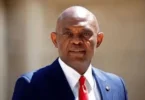The Federal Government has attributed the economic hardships in the country to decades of underinvestment across various sectors.... CLICK TO READ THE FULL NEWS HERE▶▶
This disclosure was made by the Minister of Budget and Economic Planning, Senator Abubakar Bagudu, during a briefing on the sidelines of the African Caucus meeting of Finance Ministers and Central Bank Governors held in Abuja over the weekend.
Bagudu emphasised that chronic underinvestment in critical areas such as security, infrastructure, and human capital was a significant factor in the country’s economic struggles.
“We have underinvested for decades, be it securities, infrastructure, human capital. What you hear is lack of resources, and it’s true,” he said. “When you are dealing with accumulated problems, we have underinvested in so many things in our national life. And when a leader comes along and courageously says, ‘I want to take them on,’ it’s risky and bold, but sometimes it can generate reactions.”

The minister pointed out that the lack of resources historically hampered the nation’s progress. “That is why our securities are saying they don’t have the equipment, they don’t have the personnel. Infrastructure, every community wants a road or rail, but we don’t have the money,” he noted.
“The best understanding, consistent with what happened in Lagos, the experience of President Tinubu, and what is happening in the world, is that here is the pathway in which we can deliver the Nigeria of our dreams, but that pathway is occasionally laden with stones.”
Bagudu expressed gratitude to Nigerians for voicing their concerns, especially during the African Caucus meeting, which included ministers and central bank governors from across the continent. “Speaker after speaker in the caucus meeting can relate to all that is happening here in Nigeria because it’s almost an African problem. We are not, as a continent, growing as fast as we should,” Bagudu said.
Reflecting on international support, he stressed the disparity in financial assistance between Africa and other regions. “I just finished participating in a session on the International Development Association (IDA). We are not being supported as much as we should be. Why is it possible for a country with ten million people in Europe to find $200 billion, while Nigeria, with over 200 million people, can hardly find $10 million?” he questioned. “This calls for introspection, and we have listened. Mr. President has always been humble to say democracy is not a monologue; he listens.”
Bagudu also detailed several innovative programmes aimed at transforming various sectors as part of the government’s intervention strategies. “That is how the government imaginatively came up with some programmes. If we want to live the life of other countries with whom we are competing, then we have to do things differently,” he explained.
“If we want to provide housing, we have to have a mortgage sector that works and can deliver housing; that’s why we have a mortgage fund. If we want our young ones and our manufacturing sector to blossom, we need to have a credit system; that’s why we created consumer credit. If we want a blossoming agricultural sector, that’s why we also created the National Agricultural Development Fund.”
He cited examples of successful initiatives, such as the development of sugarcane for ethanol and biofuel production, as pathways to development. “The innovative programmes, student loans, and financing schemes are catalytic. The local government autonomy reform has further provided opportunities for subnationals to key in.”
Bagudu praised the democratic process that allows Nigerians to participate in budget meetings and town hall sessions, ensuring their voices are heard. “Our budget process allows people to come to the ministry, attend town hall meetings, and participate in the budget meeting and say, ‘This is how you should do this,’ or ‘Why can’t we try this?’”
Addressing the need for government responsiveness, Bagudu acknowledged the challenges of leadership. “As a politician, there’s nothing I would love more than for people to clap for me. It’s just like the head of a household; you want your children or whoever you are taking care of to be happy with you. But sometimes responsible leadership includes, like a household, telling children to go to school against their will,” he said. “Some sacrifices are necessary, but even at that, you have to listen to your constituency, engage, and generate consensus.”
Regarding the impact of protests and associated destruction, Bagudu lamented the irreplaceable loss of life. “We can’t even put an estimate to it because somebody has lost his life. How can we quantify that?” he remarked. “That is why sometimes even those who have the noble intention of doing something are always encouraged to be hesitant because there are people who do not have such noble intentions that can always hide behind the desire of people who express themselves to create havoc, harm others. I can’t quantify that, but one life lost is big enough.”
Senator Bagudu underscore the federal government’s recognition of the multifaceted challenges facing Nigeria and its commitment to addressing them through strategic investment and inclusive governance.











